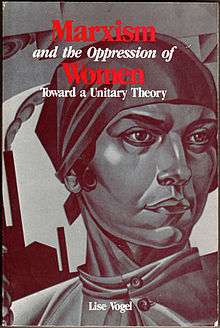Marxism and the Oppression of Women
 Cover of the first edition | |
| Author | Lise Vogel |
|---|---|
| Language | English |
| Subject | Marxism, feminism |
| Published | 1983 (Pluto Press) |
| Media type | Print (Hardcover and Paperback) |
| Pages |
231 (1987 edition) 266 (2014 edition) |
| ISBN | 978-1-60846-340-4 |
Marxism and the Oppression of Women: Toward a Unitary Theory is a 1983 book by Lise Vogel that has been called a founding text of Marxist feminism.[1] The book was republished in 2013, with an introduction by David McNally and Susan Ferguson.
Summary
Vogel examines the European and North American socialist movements' treatment of the "woman question." In Chapter One she examines what contemporary North American socialist feminist authors have said about women's oppression and how it is related (or not) to class society and the capitalist mode of production. She also discusses key debates within the North American feminist movement.
In Chapter Two she examines what Karl Marx and Friedrich Engels had to say about women's oppression. She concludes that Marx's views, while under-developed, did correctly view woman's oppression within the context of class society and the capitalist mode of production. She argues that Marx's work on individual consumption, the value of labour-power and the industrial reserve army, provided a useful basis for further work on the issue of social reproduction. In contrast, Vogel finds Engels' work defective because of its utopianism and its reliance on a dual system theory of women's oppression vs. class oppression. She acknowledges, however, that the work of Engels was very influential in socialist debates despite its theoretical weaknesses.
In Chapter Three, Vogel examines the socialist movement around the time of the Second International and the Russian revolution in order to analyse what leading activists had to say. She critiques much of what was written as a conflation of utopianism, liberalism and dual systems theory. However, she does find that Vladimir Lenin's work and German SPD leader Clara Zetkin's work both represented much more pragmatic attempts to seriously address women's oppression and involvement in revolutionary activity.
In Chapter Four, Vogel outlines two contradictory tendencies in the socialist debate about women's oppression - one which uses a dual systems analysis and the other which is rooted in social reproduction. She argues in favour of the social reproduction approach and elaborates her own theory of women's oppression from that perspective.
Reception
Political theorist Terrell Carver calls Marxism and the Oppression of Women a founding text of Marxist feminism.[1]
References
Footnotes
- 1 2 Carver 1995. p. 213.
Bibliography
- Books